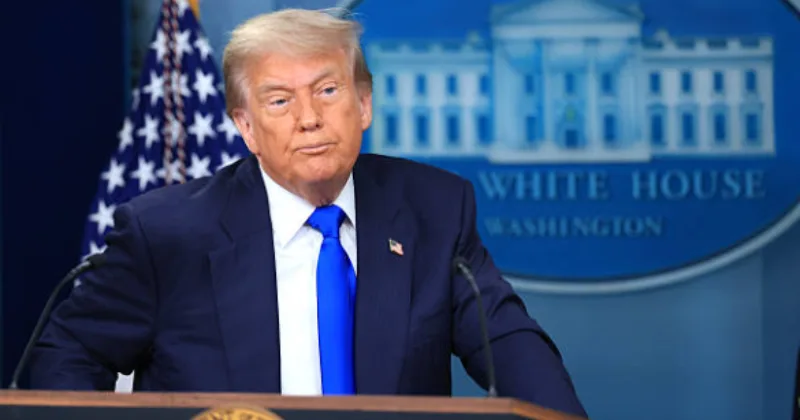As the clock ticks past midnight in Washington, the U.S. House of Representatives remains in a tense, high-stakes overnight session. Former President Donald Trump and his allies are ramping up pressure within their own Republican ranks, urging final approval of a sweeping tax and spending bill that could define Trumps mega bill second term.
Early Thursday morning, the legislation cleared a critical procedural hurdle, passing a vote just after 03:00 EDT (07:00 GMT), setting the stage for a decisive final vote.
Although opposition Democrats have been vocal against the bill, internal Republican divisions have proven equally challenging. Concerns over national debt, healthcare cuts, and other contentious provisions have caused hesitation among conservative lawmakers.

- Trump tax and spending bill
- House vote on Trump bill
- Trump second term legislation
- Medicaid cuts 2025
- GOP deficit spending
- Congressional budget battle
- US tax reform 2025
- Trump healthcare bill
The Senate previously passed the bill during an equally grueling overnight debate earlier this week. Trump has demanded that the final version be ready for his signature by Friday, a deadline that has amplified the urgency on Capitol Hill.
While Republicans control both chambers of Congress, deep policy disagreements within the party continue to complicate the bill’s passage. The legislation aims to extend expiring 2017 tax cuts and boosts funding for two of Trump’s signature priorities: border security and military spending. To pay for these, it proposes substantial cuts to Medicaid, the federal program serving low-income Americans.
Despite narrow passage in the Senate, the House remains a battleground. After over seven hours of late-night negotiations, the bill passed a procedural vote on Wednesday night that now permits a full floor vote.
Trump himself has been directly involved, holding several private meetings and posting messages online to rally support. In one post, he declared the House “ready to vote tonight” and insisted Republicans were “united” in driving forward “massive economic growth.”
But not all Republicans are convinced.
The Deficit Watchdogs
One major obstacle remains the ballooning U.S. deficit. According to the Congressional Budget Office (CBO), the Senate’s version of the bill could swell the national deficit by $3.3 trillion over the next decade—more than the House’s earlier $2.8 trillion estimate.
Fiscal conservatives, particularly those in the House Freedom Caucus, are fiercely opposed to this potential debt increase. Their stance has been reinforced by figures like Elon Musk, Trump’s former adviser, who has criticized the bill as financially reckless.
Chip Roy, a Republican from Texas, signaled growing frustration immediately after the Senate’s passage, suggesting the timeline for meeting Trump’s July 4 deadline was in jeopardy.
Freedom Caucus Chair Andy Harris praised Musk’s fiscal warnings, telling Fox News, “He understands finances, and he’s right — we can’t sustain this level of debt.”
Some lawmakers have even pushed to scrap the Senate’s version entirely. Representative Andy Ogles proposed reinstating the House-approved version, calling the revised Senate version a “dud.”
Protecting Medicaid
Another major point of resistance comes from lawmakers concerned about the bill’s impact on Medicaid. Republicans representing lower-income districts fear the cuts could be devastating to their constituents—and to their own re-election hopes.
According to The Hill, six GOP members had considered rejecting the bill over these concerns. Congressman David Valadao of California stated firmly, “I won’t support any final version that slashes Medicaid or jeopardizes healthcare stability.”
Opposition Democrats, meanwhile, have seized on these concerns. Minority Leader Hakeem Jeffries posted a defiant Instagram photo holding a baseball bat, vowing to “fight Trump’s One Big Ugly Bill.”
While some Republicans have agreed to compromises, others remain deeply uneasy. Randy Fine of Florida expressed frustrations with the Senate’s changes but ultimately said he’d support the bill, citing the need to move forward.
The CBO warns that the Senate’s version could strip 12 million Americans of health coverage by 2034, compared to 11 million under the original House plan.
The SALT Deduction Controversy
One more sticking point is the proposed change to state and local tax (SALT) deductions. Currently capped at $10,000, the deduction is slated to increase to $40,000 under the bill—but only temporarily.
In the Senate version, the cap reverts back to $10,000 after five years, raising red flags for House Republicans from high-tax states. They argue this could unfairly impact their constituents and create political headaches down the road.
Conclusion: Can Trump’s Signature Bill Survive Final Hurdles?
This bill represents more than just budget changes—it is poised to become the defining legislative achievement of Trump’s second term. Yet fierce resistance over the national deficit, healthcare cuts, and tax policies may still derail its progress.
As Republicans continue their all-night debate, the outcome will signal either a hard-won victory for Trump—or a major political blow within his own party.
Frequently Asked Questions
Q1: What is the purpose of Trumps mega bill?
A: It extends the 2017 tax cuts, boosts defense and border funding, and includes cuts to Medicaid.
Q2: Why are Republicans divided on the bill?
A: Internal GOP factions disagree on deficit increases, healthcare cuts, and SALT deduction policies.
Q3: How much will the bill add to the deficit?
A: The CBO estimates $3.3 trillion over the next decade under the Senate’s version.
Q4: What changes does the bill make to Medicaid?
A: It introduces significant funding cuts, potentially leaving millions without coverage.
Q5: What is SALT and why is it controversial?
A: SALT stands for state and local tax deductions. The bill raises the cap temporarily, causing friction in high-tax states.

